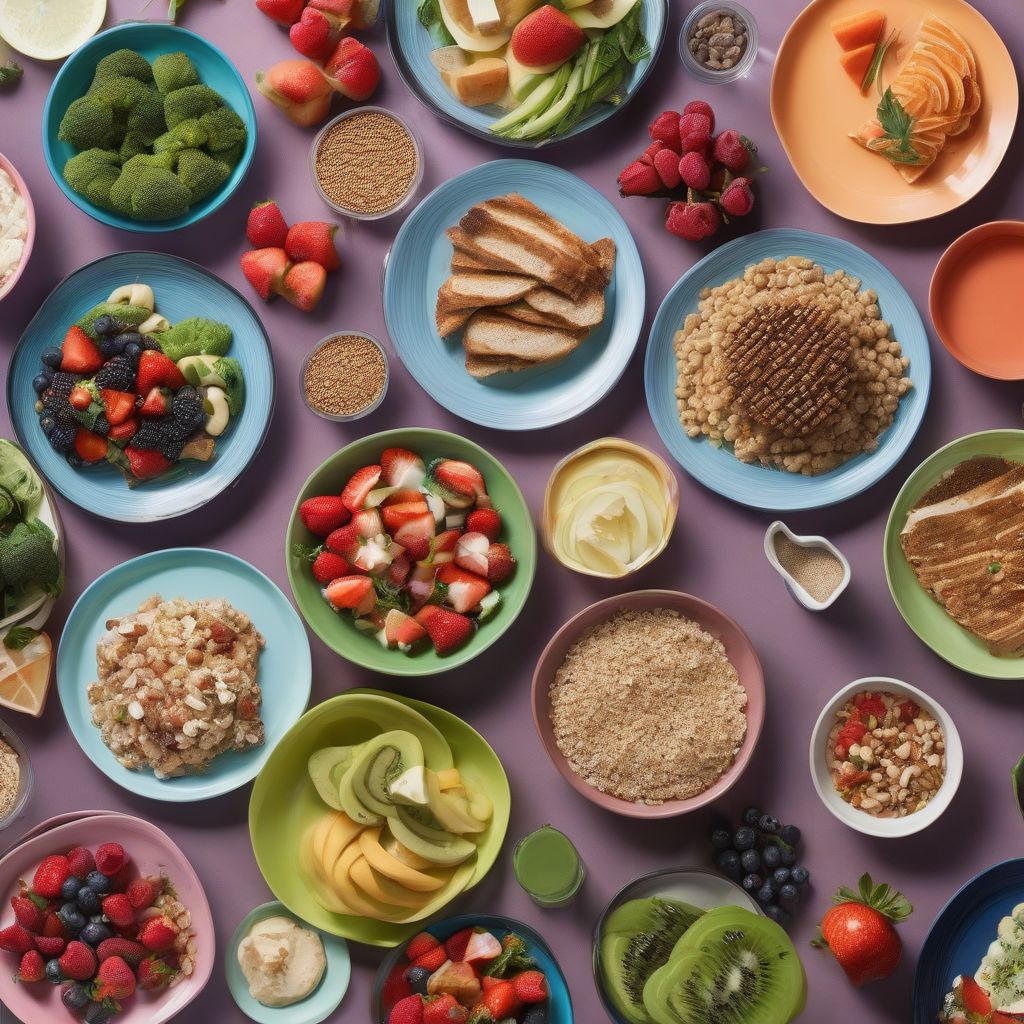“The days are long, but the years are short.” As a parent of a teenager, you know this sentiment all too well. Navigating the teenage years can feel like walking a tightrope, a delicate balancing act of offering support while fostering independence. And while every teen is unique, there are some common threads that unite the experience. One of the most impactful? Food and lifestyle choices.
As a certified nutritionist and meal prep coach, I’ve spent the past eight years helping people reach their health goals. And let me tell you, those foundational years of adolescence are absolutely critical. What teenagers eat and how they live directly impacts their physical and mental well-being, both now and in the future.
This guide will equip you with practical, evidence-based parenting tips for teenagers, focusing on nutrition and lifestyle. Let’s dive in and empower your teen to thrive!
Communication is Key: Building a Foundation of Trust
Imagine this: It’s dinner time, and your teen is glued to their phone, scrolling through social media instead of engaging in conversation. Sound familiar?
Teenagers are bombarded with messages about body image, fad diets, and unrealistic beauty standards. Add in the hormonal changes and the drive for independence, and it’s no wonder that navigating conversations about food and body image can feel like walking on eggshells.
The key? Fostering open, honest communication. Here’s how:
1. Active Listening: Put away distractions, make eye contact, and truly listen. Let your teen know that their thoughts and feelings are valid, even if you don’t always agree.
2. Create a Safe Space: Avoid judgment or criticism. Instead, focus on understanding their perspective and creating a safe space for them to share.
3. Lead with Empathy: Remember what it was like to be a teenager. Acknowledge the pressures they face and let them know you’re there to support them.
4. Family Meals Matter: Make an effort to have regular family meals together. This provides a dedicated time to connect, share stories, and model healthy eating habits.
Nutrition for Growing Bodies and Minds
Teenagers undergo rapid physical and mental development, making nutrient needs higher during this stage than at almost any other time in life.
Fueling the Body: Macronutrient Must-Haves
- Protein: Essential for building and repairing tissues, supporting hormone production, and maintaining healthy blood sugar levels.
- Good Sources: Lean meats, poultry, fish, beans, lentils, tofu, eggs, Greek yogurt, nuts, and seeds.
- Carbohydrates: The body’s primary source of energy, crucial for brain function and physical activity.
- Good Sources: Whole grains (brown rice, quinoa, oats), fruits, vegetables, legumes.
- Healthy Fats: Support hormone production, brain health, and the absorption of fat-soluble vitamins.
- Good Sources: Avocados, nuts, seeds, olive oil, fatty fish.
 Teenager Enjoying Healthy Meals
Teenager Enjoying Healthy Meals
Micronutrients: Vitamins and Minerals They Need
- Iron: Crucial for carrying oxygen throughout the body, especially important for teenage girls who are menstruating.
- Good Sources: Lean meat, spinach, beans, lentils, fortified cereals.
- Calcium: Vital for building strong bones and teeth.
- Good Sources: Dairy products, leafy green vegetables, fortified foods.
- Vitamin D: Aids calcium absorption and plays a role in immune function.
- Good Sources: Sunlight, fatty fish, eggs, fortified foods.
Hydration is Essential
Encourage your teen to drink plenty of water throughout the day. Water is essential for:
- Regulating body temperature
- Transporting nutrients
- Maintaining electrolyte balance
Addressing Picky Eating
It’s no secret that many teenagers develop selective eating habits. While it can be frustrating, try these strategies:
- Involve Your Teen in Meal Planning: Let them choose recipes or help with grocery shopping. This gives them a sense of ownership and control over their meals.
- Don’t Force It: Pressuring your teen to eat certain foods often backfires. Instead, offer a variety of healthy options and let them choose.
- Be Patient and Persistent: It can take multiple exposures to a new food for a teen to accept it. Keep offering healthy choices without making it a battle.
Building a Healthy Relationship with Food and Body Image
Teenagers are particularly vulnerable to developing eating disorders or engaging in unhealthy weight-loss behaviors. Here’s how to foster a positive body image:
- Focus on Health, Not Weight: Emphasize the importance of fueling the body with nutritious foods for energy, strength, and overall well-being, rather than focusing on weight or appearance.
- Challenge Unrealistic Beauty Standards: Discuss the unrealistic beauty standards portrayed in the media. Help your teen develop critical thinking skills to question these images and recognize that true beauty comes in all shapes and sizes.
- Encourage Self-Love and Acceptance: Talk to your teen about self-acceptance and the importance of appreciating their unique qualities. Encourage activities that promote self-esteem, such as hobbies, sports, or volunteering.
Lifestyle Habits for a Healthy Mind and Body
The Importance of Sleep
Sleep is crucial for teenagers’ physical and mental health. During sleep, their bodies produce hormones essential for growth and development, and their brains consolidate memories and process information.
- Encourage a Consistent Sleep Schedule: Even on weekends, try to maintain a regular sleep routine to regulate their natural sleep-wake cycle.
- Create a Relaxing Bedtime Routine: Encourage a calming bedtime routine, such as taking a warm bath, reading, or listening to relaxing music.
- Limit Screen Time Before Bed: The blue light emitted from electronic devices can interfere with melatonin production, a hormone that regulates sleep.
Physical Activity
Regular physical activity offers a wealth of benefits for teenagers:
- Improves cardiovascular health
- Strengthens bones and muscles
- Reduces stress and anxiety
- Boosts mood and self-esteem
Encourage your teenager to find activities they enjoy, whether it’s joining a sports team, dancing, hiking, or simply going for a walk with friends.
Managing Stress
Teenage years are filled with academic pressures, social dynamics, and hormonal changes, all of which can contribute to stress.
- Open Communication: Create an environment where your teen feels comfortable talking to you about their stressors.
- Teach Stress-Management Techniques: Introduce them to healthy coping mechanisms, such as deep breathing exercises, mindfulness, yoga, or spending time in nature.
- Encourage Hobbies and Interests: Having outlets for creativity and enjoyment can provide a sense of accomplishment and relief from stress.
Supporting Your Teen’s Mental Well-being
Mental health is just as important as physical health. It’s normal for teenagers to experience mood swings, but if you notice persistent sadness, withdrawal, changes in appetite or sleep, or other concerning behaviors, reach out for professional help.
Don’t hesitate to consult with your teen’s doctor or a mental health professional. Early intervention is essential for addressing mental health concerns.
Conclusion: Raising Healthy and Resilient Teenagers
Parenting teenagers comes with its fair share of challenges, but remember, you don’t have to be perfect. By focusing on open communication, providing nutritious food choices, encouraging healthy lifestyle habits, and supporting your teen’s mental well-being, you’re creating a strong foundation for them to thrive during these transformative years and beyond.
What steps are you taking to support your teenager’s health and well-being? Share your thoughts and experiences in the comments below!
- Dinkmeyer Sr. PhD, Don (Author)
- English (Publication Language)
- Fay, Jim (Author)
- English (Publication Language)
- Demon Slayer: Kimetsu No Yaiba - 4
- Demon Slayer: Kimetsu No Yaiba - 4
- Damour Ph.D., Lisa (Author)
- English (Publication Language)
- The 7 Habits of Highly Effective Teens
- Covey, Sean (Author)
- Tripp, Paul David (Author)
- English (Publication Language)
- Audible Audiobook
- Frances E. Jensen (Author) - Tavia Gilbert, Frances E. Jensen (Narrators)
- Mars, Dr Christina (Author)
- English (Publication Language)
- Harvey, Pat (Author)
- English (Publication Language)
- Audible Audiobook
- Dr. John Duffy (Author) - Anne Cross (Narrator)










